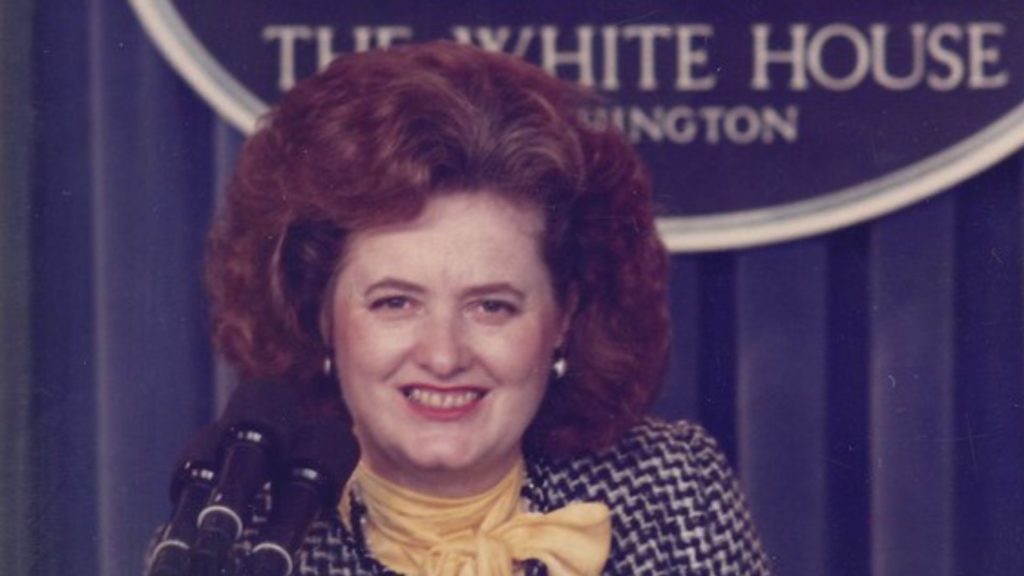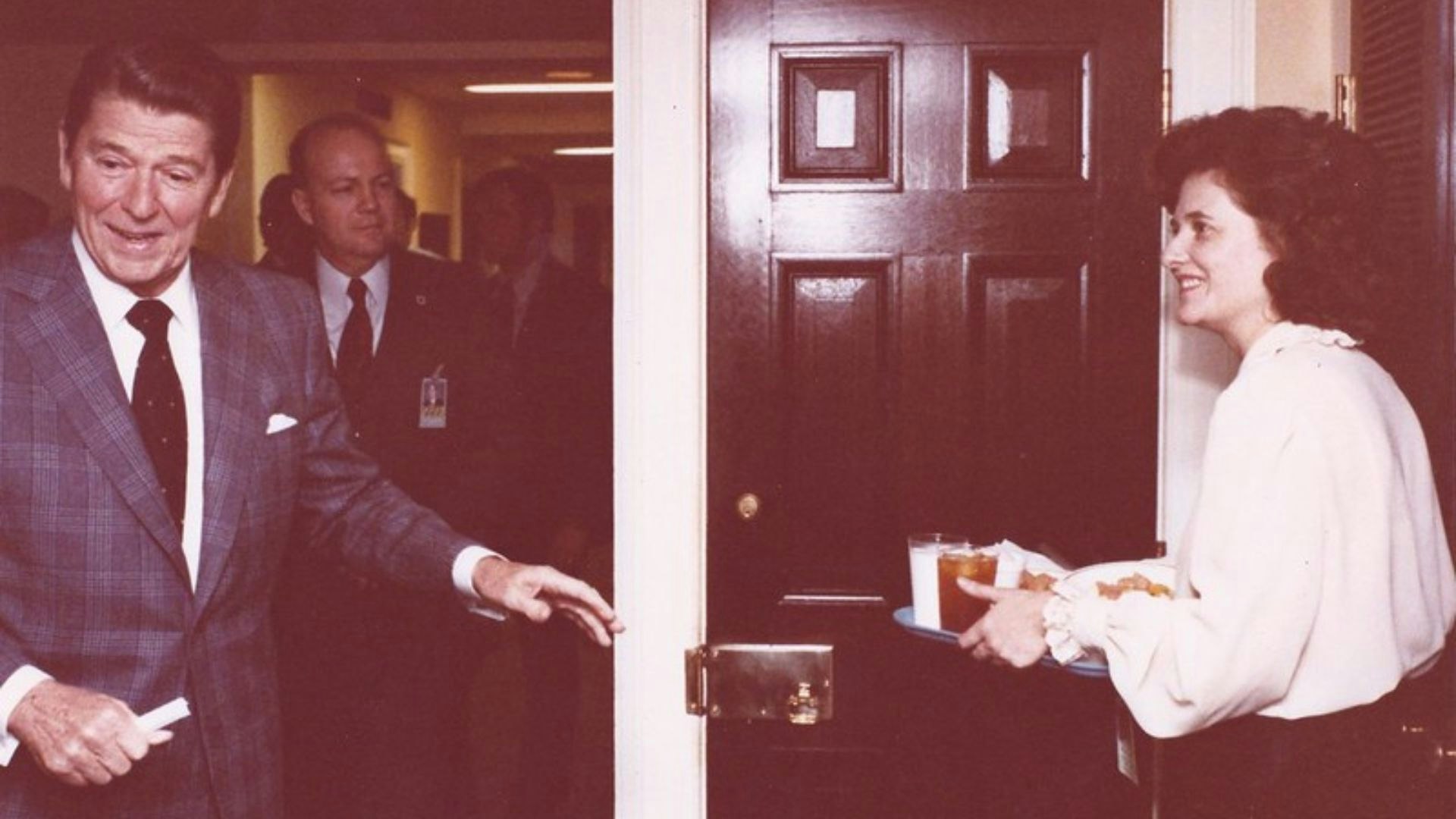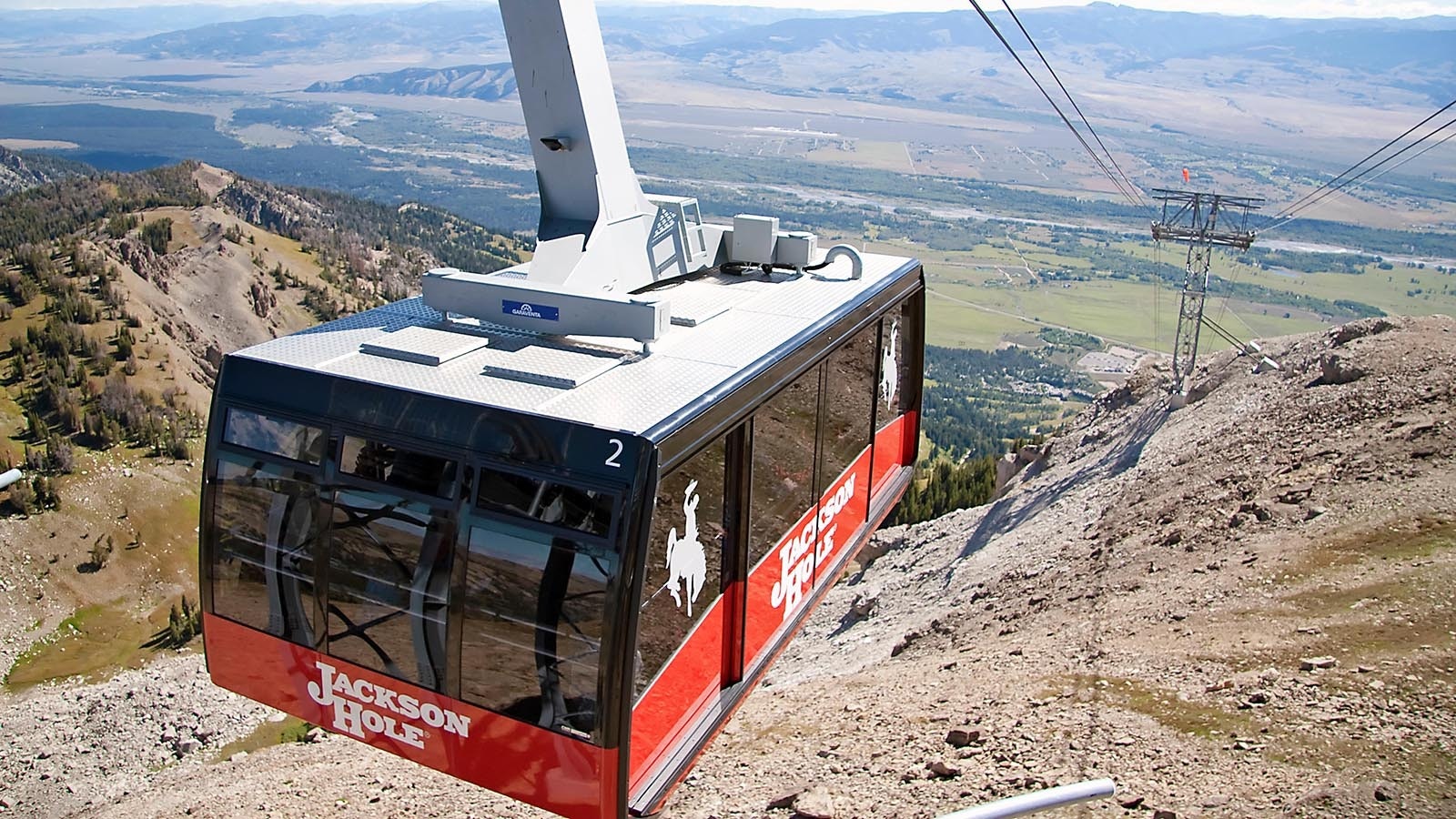By Wendy Corr, Cowboy State Daily
“As Ronald Reagan said, the presidency is an office that belongs to all the people – and whoever occupies the Oval Office at any given time is merely a temporary custodian.”
– Connie Gerrard
There are a handful of people from Wyoming who have worked in Washington, D.C., and made careers of navigating politics.
But few have had a more intimate view of the office of the President of the United States than Connie Gerrard of Evanston, who as a young woman made the decision to leave behind her life in the West and make a go of it in the nation’s capital.
For 25 years, she said she sat “a stone’s throw away from the Oval Office” in the Press Office at the White House under five presidents – Johnson, Nixon, Ford, Carter and Reagan – ending her remarkable career just as President George H.W. Bush took office.
“Occasionally during the transition period following an election, the incoming presidential staff has asked someone from the previous administration to stay on to help them navigate their new life in the White House,” Gerrard shared with Cowboy State Daily. “I was asked to do that in the White House Press Office by six incoming administrations, of both political parties.”
The Pride of Evanston
Gerrard, who is now in her 80s and continues to live in Washington, D.C., graduated with the class of 1958 from Evanston High School with no more than 70 other young Wyomingites, according to Dan Wheeler, coordinator of the Hall of Fame committee in Evanston.
“I was like 10 or 11 years old when she was in high school,” Wheeler told Cowboy State Daily. “But how a girl from Evanston, Wyoming, ended up in Washington, D.C. (working) with five presidents – and, they all had different political affiliations, which is something pretty much unheard of – it just made everybody here pretty proud. I think she’s an outstanding alumni.”
Rob Wallace, another Evanston native who made a name for himself in Washington, D.C., as assistant secretary for the U.S. Department of the Interior for fish, wildlife and parks (he oversaw the National Park Service and U.S. Fish and Wildlife Service) said Gerrard was considered a legend among people in her hometown.
“The remarkable thing about Connie’s career is the longevity – how long she served in the White House,” said Wallace. “That’s pretty special, not simply because she’s from Wyoming – that’s pretty special for anybody working in the White House, to have been there for that long.”
Wallace said the people who knew her from Evanston loved to brag about Gerrard’s success in such a high-stress, high-profile job.
“There’s a lot of politics, I suspect, even if you’re in a non-political role,” said Wallace. “And the fact that she did – and succeeded – is a really bright star for Evanston, Wyoming.”
Leaving Home
When Gerrard graduated from Brigham Young University in 1963, she followed in the footsteps of her sister Judy, who was working at the time for Sen. Hubert Humphrey.
Gerrard joined the staff of then-Vice President Lyndon Johnson just three months before President Kennedy was assassinated and Johnson was sworn in.
During her quarter-century at the White House, Gerrard was a quiet witness to the high-profile visitors who were guests of sitting presidents.
“I saw kings and queens, prime ministers, movie stars, baseball players and rock singers all visit the White House,” she said. “And just when I thought I’d seen it all, something else would come along.”

Johnson’s Temper
“LBJ was sometimes bigger than life,” Gerrard said about President Lyndon B. Johnson, the first president she served under.
His temper was legendary, and Gerrard recalls being sworn at by the president when she couldn’t find a paragraph in the printed copy of a speech he wanted revised – not knowing that he already had a more recent copy than the one she held in her hands.
“’I’m sorry, Mr. President, I can’t find the paragraph,’ I stammered. Without a pause came the words from on high, ‘Well, you stupid SOB,’” Gerrard recalled. “But to LBJ, every person on his staff was an SOB at one time or another.”
Vietnam And The Civil Rights Movement
The Johnson administration fell during the height of the civil rights movement, as well as the beginning of the Vietnam War. For Gerrard, life in Washington, D.C., was rife with tension.
“The assassination of Martin Luther King provoked rioting in cities throughout the country, and it became necessary to place a curfew on the District of Columbia,” she said. “I was asked to stay overnight at the White House in a guest room in the mansion in case of any immediate national emergency action the president might need to take in this volatile situation.
“When in the following days I could go home for a few hours of sleep, it was an eerie feeling to have the streets of the Nation’s capital completely deserted except for nearly 12,000 soldiers patrolling and their military vehicles.”
One of Gerrard’s duties during this time was to organize and type notes from the president’s meetings with the secretary of state, secretary of defense, and director of the CIA to plot secret war strategies for the Vietnam conflict.
“There were wrenching knots in my stomach so many times to know of the impending bombing missions, and then to anxiously read about the outcome of those missions in the pages of The Washington Post,” she said.
A Woman In The White House
In the 1960s, the women’s rights movement was still another decade away and women were treated very differently than they would be in years to come.
But Gerrard’s position as a White House aide afforded her access to areas otherwise off limits to her gender.
“When LBJ flew out to the aircraft carrier, the USS Enterprise, to observe night-time airborne maneuvers, even women in the navy were not permitted to stay overnight on aircraft carriers,” Gerrard said. “But the two of us on the president’s staff did, with a Marine and his bayonet standing guard outside our door all night.”
She also received a compliment – maybe – from LBJ prior to addressing troops at Ft. Benning, Georgia.
“I was working in the press area when I glanced at the president, who was seated on the stage having just made his grand entrance to the strains of ‘Hail to the Chief,’” Gerrard recalled. “He motioned frantically toward me. I tiptoed up to the stage. He got up out of his chair, leaned over to me and whispered in my ear, ‘Honey, stand behind the stage, outta sight. Those boys will be looking at you and not listenin’ to my speech.’”
Nixon Administration
Every White House is a reflection of its president, Gerrard noted. And Richard Nixon was as different from Johnson “as daylight is from dark,” she said. “Richard Nixon was obviously a more formal man.”
Because Nixon was determined to make foreign policy a key point of his time in office, he organized a small group that visited the People’s Republic of China in 1972, the first visit by an American president in nearly 30 years. And Gerrard was thrilled to be a part of the historic visit.
“We attended elaborate state dinners with government officials and Chinese achievers in the arts and sports fields as our table companions,” she said.
Gerrard was pleasantly surprised when the Chinese military band, which was playing American music in honor of their guests, played a song close to Gerrard’s heart.
“Being from Wyoming, I was delighted when, at the welcome banquet given by Premier Chou En-Lai in the Great Hall of the People, the orchestra struck up ‘Home on the Range,’” she said.
Watergate
Gerrard’s involvement in historical events continued through the Nixon administration as the Watergate scandal took over Washington. Gerrard said that Nixon began spending more time away from the White House – in California, Camp David and, virtually every weekend, Key Biscayne, Florida – and her job was to keep track of the Watergate revelations as they were released.
“Every Saturday night about 11 p.m. at the Florida White House, I placed a call to New York,” she said. “There, a former staff member had trekked across town for the first edition of the Sunday New York Times. From front to back of the big Sunday Times, she would read me the massive Watergate stories.
“And I, with telephone crooked on my shoulder, would type sometimes close to 100 pages. I would finish around 5 a.m. and deliver copies to the president’s office and the senior staff, who were waiting to read every word.”
President Ford
Gerrard said she was relieved when the Nixon era came to an end. She welcomed newly appointed President Gerald Ford, calling him “the right man at the right time.”
“He had a sterling reputation of integrity, and his calm demeanor comforted an agonized nation,” she said. “I am always dismayed when Ford is regarded as just an asterisk in history.”
Calling himself “the accidental president” to his staff, Gerrard said he enabled the nation to bind up its wounds.
“We are better off because he served,” she said.
The Iran Hostage Crisis
Gerrard remembers well when, midway through President Jimmy Carter’s term, 52 Americans were taken hostage at the U.S. embassy in Tehran.
“When the United States failed in an attempt to rescue those hostages, I was called back to the White House at 1 a.m. to prepare for a pre-dawn announcement of that failed mission in which eight Americans were killed in the Iranian desert staging area,” she said.
Gerrard noted that the hostage tragedy contributed to Carter’s defeat in the next election.
“Carter, honest and well-meaning, had done his best in serving the nation,” said Gerrard.

The Assassination Attempt
Gerrard remembers President Ronald Reagan as being genuinely engaged and interested in the lives of his staff.
“Whether I had relatives visiting Washington or they happened to be in another city where the president was making an appearance, he was always delighted to meet them and to have a picture taken,” she said. “I was usually standing nervously in the corner hoping no one overstayed their welcome, but President Reagan liked people and never seemed anxious to move on.”
But her most vivid memory of the Reagan years is of March 30, 1981, when staff got the call that there had been a shooting at the Washington Hilton Hotel, where the president had gone to make a speech.
“The White House Press Office rapidly became the center of activity, with reporters literally knocking each other out of the way to get information,” said Gerrard.
Because one of those injured was her immediate boss, Press Secretary James Brady, the violent act felt very personal to Gerrard and her co-workers.
“Needless to say, it was a time of great stress and intense emotion,” said Gerrard. “But everyone in the Press Office knew that, regardless of the horrific circumstances, Jim would want us to be calm and professional, and we did our best throughout the terrible days that followed.”
‘The Door Is Always Open’
When Gerrard chose to leave her position in the press office in 1989, near the beginning of George H.W. Bush’s administration, she did so with the knowledge that the office of the president was being occupied by a man dedicated to traditional American values.
“President Bush was the very persona of decency and modesty, and he was unfailingly kind and thoughtful,” she said. “Upon my leaving the White House he gave me a beautiful handwritten note wishing me well and assuring me that the door was always open should I wish to return.”
But after 25 years, Gerrard said she was relieved to let go of the stress, despite the exotic and unique locales she had worked from.
“We dispatched the words and deeds of the president of the United States from stately rooms in the Kremlin, from army barracks, from ornate palaces in Saudi Arabia and Egypt, from railroad stations, from hospitals, from moving trains, ships, river paddle boats, airplanes and helicopters; from trailers and sports arenas, from parking garages, from tents, campground kitchens, fire stations, and even from dog kennels,” she remarked.
Dream … Or Nightmare?
While some might think working with the President of the United States would be a dream job, sometimes it was a nightmare, Gerrard said.
“I had toiled tirelessly in the Press Office at the White House for 12 to 15 hours a day, six or seven days a week and had boarded press charters to all 50 states several times each,” she said, “and I had traveled the globe to 59 countries over six continents – 2 million miles, or the equivalent of eight times around the world.”
And while she logged some once-in-a-lifetime experiences (including cuddling a koala in Australia and catching a glimpse of the Crown Jewels of the Czar at the Kremlin), not all of those experiences were pleasant.
“Motorcades during the Vietnam War were plagued with heckling protestors who tried to block the road or hurled rocks at us,” said Gerrard. “In Australia, we were pelted with raw eggs. There were also bomb threats in our hotel in London and a speech site Chicago, and a fire in our hotel on another London trip.”
‘A Profound Privilege’
Gerrard said it was a “profound privilege” to serve in the White House for so many years.
“It gave me a deep appreciation of the superiority of this great nation,” she added, “and the absolute necessity for strong leadership in the world by the United States of America.”





